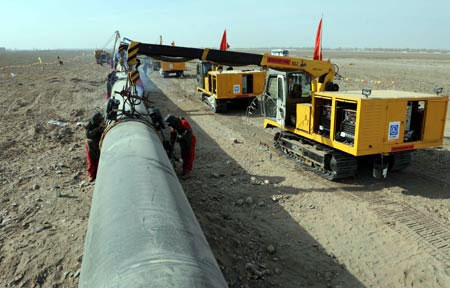A planned industrial project will threaten the environment and health of thousands of people in Rakhine State as well as destroying Burma’s second largest mangrove forest, according to a report titled “Danger Zone” which was released this week by Arakan Oil Watch, an environmental NGO in Burma.
 The report says that up to 40 villages are threatened with toxic waste and pollution from the petrochemical and metal industries being planned for the 120 sq km Kyaukphyu Special Economic Zone, which will include a deep-sea port and is the starting point for a pipeline which will transfer oil and gas to China.
The report says that up to 40 villages are threatened with toxic waste and pollution from the petrochemical and metal industries being planned for the 120 sq km Kyaukphyu Special Economic Zone, which will include a deep-sea port and is the starting point for a pipeline which will transfer oil and gas to China.
Arakan Oil Watch said that a large amount of land in Kyaukphyu has already been confiscated from villagers in preparation for the US $2.4 billion project, which is being financed by the China Development Bank.
“China’s projects will uproot tens of thousands of people in Arakan [Rakhine] State and spark conflict,” said Arakan Oil Watch Director Jockai Khaing. “Burma’s government and investing companies should learn from what is happening at the Monywa copper mines.”
Companies from six different nations are shareholders in the 771-km gas pipeline, including China’s SEAOP, the South-East Asia Crude Oil Pipeline Company Ltd, which is a subsidiary of China National Petroleum Company based in Hong Kong, and which has a majority shareholding of 50.9 percent.
The other 49.1 percent is broken down to: Daewoo International – 25.041 percent; ONGC Caspian E&P – 8.347 percent; Myanma Oil and Gas Enterprise – 7.355 percent; Korea Gas Corporation – 4.1735 percent; and GAIL India Corporation – 4.1735 percent.
The deep-sea port at Kyaukphyu is designed to help facilitate the transport of large shipments of storage containers on vehicles to China.
The main investors in the deep-sea port are China’s CITIC Group, Japan’s Nippon Koei, and Burma’s Htoo Trading Company.
“What is the government thinking—handing over our pristine coastlands to foreign companies to turn into a toxic industrial zone?” said Jackai Khaing.


